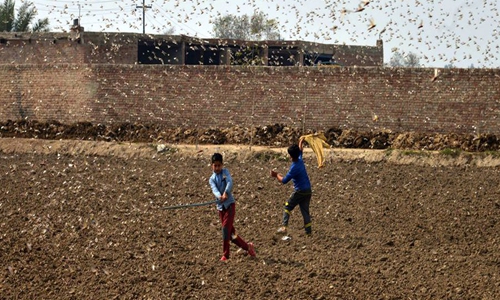Relying on a “duck army” to help fight Pakistan’s war against crop-eating locusts is impractical, said Chinese experts, saying that whoever came up with this novel idea disrespected the hard work of Chinese experts, who are in Pakistan to help troubleshoot the crisis.
Ducks rely on water, but in Pakistan’s desert areas, the temperature is very high, so the idea of relying on ducks to chomp through locusts is unrealistic, Zhu Jingquan, an official from China’s National Agro-Tech Extension and Service Center, also a member of the delegation of Chinese experts sent to help Pakistan, told the Global Times on Wednesday.
His response came after previous reports that said a Chinese company in East China’s Zhejiang Province plans to send an army of more than 100,000 ducks to fight locusts in Pakistan.
China explored the use of ducks to chomp through locusts in Northwest China’s Xinjiang Uygur Autonomous Region, but found ducks’ ability to combat locusts was limited to a small area, said Zhu, not to mention the complicated paperwork needed to send animals abroad.
Some experts called the idea “absurd” and “an insult to experts’ authority” and urged people to show respect for experts’ hard work in Pakistan.
Zhu said he and other experts have carried out a field survey on locust-invaded cropland in Pakistan’s Punjab province, helping the country develop an emergency response plan to control the growing swarm of locusts, and advised the use of chemical or biological pesticides.

The desert locust swarm attacks have affected crops across millions of acres of land, posing a serious threat to food security in Pakistan.
China also urged local authorities to prepare for the possible arrival of the voracious insects from neighboring Pakistan and India, the National Forestry and Grassland Administration said on Tuesday, warning that China, too, faces the risk of a possible locust invasion.
The warning aims to prepare relevant regions for the possibility, which is very slim based on previous evaluations by Chinese authorities, said Chinese experts, who noted that the most probable victim would be Northwest China’s Xinjiang Uygur Autonomous Region, where swarms could fly across from Kazakhstan.
However, the climate in Xinjiang won’t be suitable to those insects.
Zhu said two other routes of the invasion, to Southwest China’s Tibet Autonomous Region from Pakistan and India, or the Yunnan Province through Myanmar, are geographically and climatically difficult, given the natural barrier of the Himalayas would be impossible for the swarms to pass, and their activity will be hampered by the extreme cold.
“The climate in Myanmar is not suitable for desert locusts to survive,” said Zhu.


